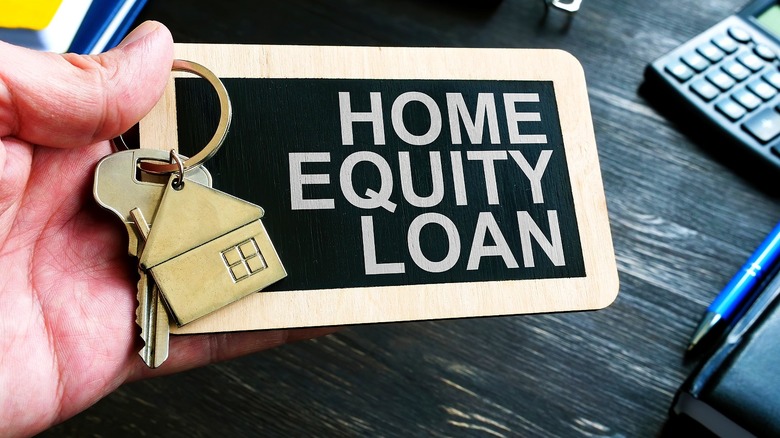How Are Interest Rates Calculated For Home Equity Loans?
Since the beginning of the COVID-19 pandemic, the average sales price of a home in the United States has surged by nearly 35%. However, extracting that equity from your home isn't as painless as it once was. A policy of higher interest rates by the Federal Reserve to combat inflation has resulted in higher mortgage rates, too. Yet, some homeowners continue to refinance their first mortgages in order to extract equity. This, in spite of facing a significantly higher rate of interest than their old mortgage, which isn't a terrific spot to be in.
However, another alternative to unlock your home's price appreciation is to take out a home equity loan instead. A home equity loan is a second mortgage on your property that lets you borrow money using the equity in your home as collateral. Plus, there's no need to sell the home or refinance your existing mortgage to do so. Once secured, the borrowed funds can be used for anything.
Some homeowners opt for a home equity loan to fund repairs or remodeling projects for the home itself, while others might use the money to consolidate expensive debt, such as credit card balances. And, although it's ill-advised, let's face it, some borrowers will also use home-equity money to pay for living expenses or splurges, such as vacations or toys like travel trailers and boats. Depending on exactly how the funds from a second mortgage are spent, the interest paid on the home equity loan could be tax deductible.
The US prime rate of interest
The interest rates for home equity loans are frequently based on a number called the prime rate. The prime rate is defined as the lowest rate lenders are willing to offer their most creditworthy borrowers. While banks are free to set their own prime rates, The Wall Street Journal surveys 30 different banks to reach a consensus and publishes that figure, which is typically observed as the benchmark prime rate. As of May 1, 2024, the WSJ prime rate stood at 8.50%.
However, home equity lenders will typically add a profit margin to the prime rate in order to make the loan worthwhile. For example, a lender might charge a margin of 1.45% on top of a prime rate of 8.5% for a total rate to the borrower of 9.95%.
It's important to note that the margin charged in excess of the prime rate varies between lenders, so some will be higher than others. In certain cases, lenders may even offer rates lower than the prime rate to a particularly strong borrower with great credit, income, and loan-to-value ratio. Therefore, it definitely pays to shop around. Also note that home-equity-loan rates are fixed, so they will remain the same for the life of the loan, regardless if ambient interest rates rise or fall.
Why a higher interest rate is actually okay
It's worth pointing out that in May 2024, traditional 30-year mortgage rates hovered around 7%. So why would a borrower want to pay almost 10% on a home equity loan instead? The reason is because the higher interest rate is only levied on the built-up equity that's being extracted, not the entire value of the home. For example, let's take a look at a simplified example of a homeowner with a $300,000 mortgage balance at a rate of 3%, yet the property is now worth $400,000.
A home equity loan could allow the homeowner to borrow $100,000 — albeit at nearly 10% — but without disturbing the original mortgage balance at 3%. That's compared to refinancing the existing $300,000 first mortgage for a new value of $400,000 with an interest rate of 7%, which ultimately will be more costly. As well, home equity loans typically have lower closing costs and fees than mortgages do.
If you think that a home equity loan is right for your needs, you'll want to consider some easy ways to improve your credit score before applying in order to qualify for the lowest rates. Next, you'll want to gather documents like proof of income, bank statements, and proof of your home's increased value (though lenders will likely want their own appraisal). As previously mentioned, shop around before selecting a bank or other lender; and, besides interest rate, also consider closing costs and fees, which factor into the overall cost of the loan. Finally, don't be afraid to negotiate or haggle with potential lenders to score the best deal.


